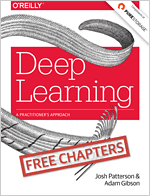1. Don't eat the ecosystem
|
In this podcast, Tim O'Reilly describes a lesson that voice platforms could learn from companies like Microsoft. "One of the key things that we learn is that these platforms…can't just serve their users. They have to actually create a rich ecosystem of suppliers. Part of the reason that Microsoft became less dominant was that they kind of ate the ecosystem. It was no longer a place of opportunity. So…the opportunity became the internet."
+ WTF? What's the Future and Why It's Up to Us
|
2. Is AI riding a one-trick pony?
|
| "Just about every AI advance you've heard of depends on a breakthrough that's three decades old. Keeping up the pace of progress will require confronting AI's serious limitations."
|
3. Google's AI is no smarter than a 6-year-old
|
| But it is twice as smart as Apple's Siri, according to Chinese researchers.
|
4. Teaching databases to learn in the world of AI
|
| At Strata in New York, Nikita Shamgunov explored the future of databases for fast-learning adaptable applications. Watch→
|
5. Sentiment analysis with Apache MXNet
|
| A hands-on look at how to use deep neural networks to make sense of unstructured text (with Jupyter notebook).
|
In collaboration with PureStorage
Free chapters—Deep Learning A Practitioner's Approach
|
 Machine learning projects are often scuttled before they get far. How can machine learning make a real difference in your organization? This hands-on guide not only provides the most practical information available on the subject but also helps you get started building efficient deep learning networks. And Pure Storage has made it possible for you to get chapters 1 and 3, free. |
6. Mind games
|
| Confusion over what AI is poses challenges for CFOs.
|
7. Question answering with TensorFlow
|
| How to use advanced neural networks to tackle challenging natural language tasks (with corresponding Python code and iPython notebooks).
|
8. A TensorFlow-based production-scale ML platform
|
| Creating a platform for reliably producing and deploying machine learning models takes a lot. You need: "a learner for generating models based on training data, modules for analyzing and validating both data as well as models, and finally infrastructure for serving models in production." In this research paper, Google researchers describe a TensorFlow-based production-scale machine learning platform.
|
Want to speak at the AI Conference in Beijing?
|
|
|
9. Human-level AI is right around the corner—or hundreds of years away
|
| IEEE Spectrum asked several experts, "When will we have computers as capable as the brain?" Surprise! There is no consensus.
|
10. Coming down with something?
|
| AI could warn you.
|